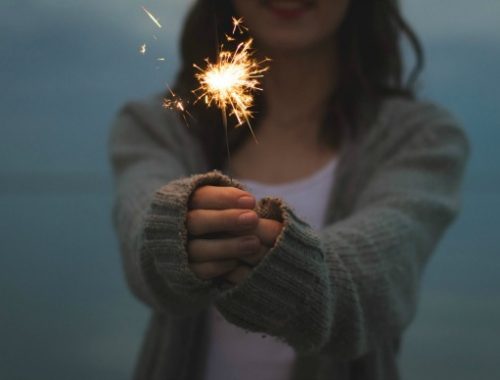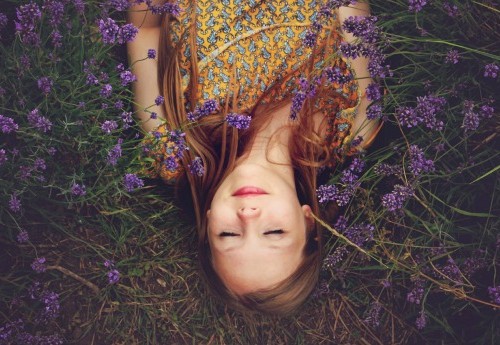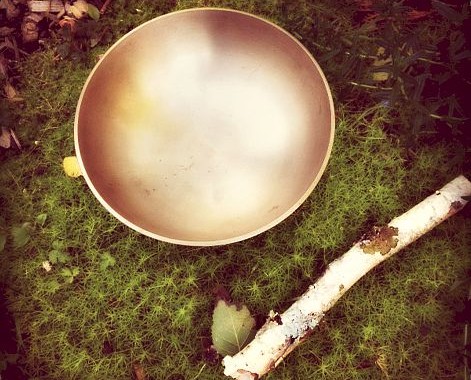It makes sense that we would all want to be as present as possible. After all, who wants to fritter their life away in constant distraction?
When thinking about meaningful moments in our lives it’s easy to run off a list of the big moments-birthdays, weddings, births, promotions, achievements, retirement. We all make a special effort to be present for these moments and in many cases there are special rituals and traditions that helps us.
But what about all the small moments between the seemingly big ones. Are they any less important? A child hugging you tightly after they’ve fallen and hurt themselves, seeing the small wisp of steam rising from a cup of tea, a stranger smiling at you at the grocery store.
We dream of the big moments and expect that we will be present for them because they’re big. But if we’re unable to be there for the small moments, why do we think we’re going to do a better job of being there for the bigger ones?
Being Present Is A Practice
Somatic Coach and trainer, Richard Strozzi Heckler, says “You are what you practice.”
If you spend time being distracted, you cultivate the practice of distraction. If you spend time being present, you cultivate the practice of presence.
It’s as simple as that.
It’s a difficult truth because we are saturated in convenient and enjoyable options for being distracted. To turn away from all of this we need to make an intention to be more present.
And this ‘being more present’ becomes a new practice.
That starts with making presence something that is focused and engaging for you.
Because a practice is something that you are going to want to come back to again and again. The best way to make the door slam shut on a good intention is to make it seem like a chore.
A Simple Doorway Into Presence
There is a doorway into presence that, by its nature, wishes to stay open.
It’s the door of Curiosity.
The door of curiosity is a doorway that invites you to leave judgements behind. It encourages a sense of playfulness. There is a lightness to curiosity, and when you are deeply curious everything becomes fresh and gives you a sense of nourishment.
There’s an energy to curiosity that keeps pulling you lovingly forward. Well, it my also invite you sideways at times, which is why it helps to have a clearly focused goal to work with that will keep your curiosity on course.
We will talk about how to build that in in a little while.
Getting Curious About Curiosity
One of the root meanings of curiosity comes from the word curiosa meaning ‘full of care’. I like that the quality of ‘care’ is inherent in the concept of curiosity. It makes sense too, that care wold be a necessary ingredient that allows curiosity to remain engaged with it’s subject.
The act of remaining engaged through curiosity also deepens the sense of care. When we are with something in a curious way, care seems to naturally come up. There is this self generating quality of aliveness that also builds up over time.
Curiosity is in all of us. It pretty much ran the show when we were small children and is lying there inside you always ready to be reactivated.
The How Of Curiosity
Curiosity begins in the body.
It’s awakened by our senses: sight, sound, smell, taste, touch. The flood of information from the outside world is met at the door by curiosity, which then proceeds to hang out with them, relish, mingle and learn from then.
Our mind is awakened in this meeting, and thoughts and questions rise up as we try to process new information.
This wonderful and natural process can also get a little overwhelming if our goal is to not get carried away.
It’s important that we take some time to think about how we want to be present. This will help us find ways to harness our curiosity, to allow us to remain present and not be pulled away.
Questions
Questions are a simple tool we can use to create a sense of focus and direction. A question gives our curiosity an agenda, a purpose. Unchecked curiosity can lead us in an infinite amount of directions, and that’s not a bad thing if that’s what you are wanting to so. But if you have a specific goal, like being present for ourselves, then direction and focus are going to be helpful.
In his book, ‘The Big Leap’ Gay Hendricks introduces the idea of wonder questions. These are questions designed to inspire a sense of wonder in the questioner. They are open ended and yet focused at the same time. And start with the phrase “I wonder …”
A useful wonder question might be “I wonder what it would be like if I could feel my breathing whenever I wanted?”
This kind of question allows our curiosity to wake up a little, and gives it a sense of focus. Our curiosity is being given the sole task of feeling the breath.
Another benefit of the Wonder Question is the aspect of embodiment it offers. Hendricks suggests that when you ask the question to yourself, you ask the question out loud and at the end you add a humming sound.
As in, ““I wonder what it would be like if I could feel my breathing whenever I wanted? Hmmmmmm.”
This humming is something that we’ve all done when asking a question, but in this case it has a distinct effect that helps the process.
When you hum in this way after the question it sends a vibration through the body, as if you are infusing the question through your whole being.
Try it. There is something magical about humming, and it certainly gives a sense that you are bringing your whole self to the question.
And this is important, because sometimes questions can exile us from the body. Holding a question in this embodied way helps keep it engaged with the body and infused with aliveness.
Reflection
Reflection is something that generally happens after the event, but this is a really helpful step and will help you to direct and get the most benefit from your rides into curiosity.
After you’ve spent some time with this question that’s designed to help you explore the present moment, it’s really helpful to scribble a few notes about your experience.
Was it interesting? Dull? Did anything new reveal itself? Did anything shift in your thinking, in your body, when you were present to your breath in this way?
Even if you don’t keep these notes there is value just from taking a moment or two to process and integrate what happened.
It also helps to build habit, ritual, and a sense of history into your presence practice.
A Presence Practice For You
Softening Into Curiosity:
Pick an activity that gives you pleasure-eating chocolate, drinking tea, sitting in front of a fire, stepping into the garden.
Think of a simple question you can ask yourself that focuses on your present moment experience of this activity.
Eg: “As I drink this cup of tea, I’m wondering if I can be aware of these sensations I’m feeling?” or “As I walk through the garden, I’m wondering if I can be aware of the smells that come to me?”
Oh, and remember to hum at the end … Hmmmm? Now that you have your activity, and a question to help you focus:
Soften.
Let go of everything you know about this activity.
Let go of your previous experiences, and any thoughts about how it might be this time. Just soften so that you can be receptive for the activity.
Do this by allowing your awareness to drop down through your body. Imagine your awareness as the slowest, gentlest waterfall—the water is perfectly warm and comfortable as it moves down through your body. Allow this awareness to move all the way from the top of your head down to your feet.
Once you feel present and receptive, begin your chosen activity.
Pretend it’s the first time ever.
Allow your question to guide you, and if other sensations/feelings come up, notice them too.
Once you’ve spent a few minutes doing your activity, exploring your experience make sure to jot down a few notes.
It could be in a journal, on a scrap of paper. It doesn’t matter much, the important thing is to capture it somewhere. Doing this helps you to integrate the experience. If you do this exercise regularly your reflection notes will become valuable as you will begin to see your experience shifting over time.
You might start to notice different sensations and feelings that come up, and your relationship to this activity may deepen, or change over time.





33 Comments
As someone who lives in a perpetual state of wonder and curiosity, I loved the idea of asking a question out loud and making a humming sound to bring yourself into the moment to fully experience the sensations that the experience brings. As an air sign (with 5 other planets in air), I tend to fly off into the cosmos and staying present is one of my big challenges. I seem to process a huge amount of information and stimulus simultaneously and often “forget” to savour the moment that is bringing the experience. I love this book by Gay Hendricks and found the same ideas echoed in Elizabeth Gilbert’s newest book, “Big Magic: Creative Living Beyond Fear”. These two lines really resonated with me, Dave: “If you spend time being distracted, you cultivate the practice of distraction. If you spend time being present, you cultivate the practice of presence.” Thanks for the wonderful exercise to practice presence.
Thank you so much for this insight and for sharing the practical steps. Very helpful.
Hi Denise,
Thanks for commenting! Glad the post was helpful for you.
Hi Beverley,
I’ve heard other people praising Elizabeth Gilbert’s new book, it sounds like a must read. I can certainly relate to what you said abut processing lots of information, and that’s one of the reasons I like having specific practices to keep me grounded and in the moment. So glad you enjoyed the post!
What a wonderful post, Dave! More and more, I am seeing curiosity and wonder as gateways to joy and, your word, presence. I love the humming idea. I’ve seen it as a practice in the rabbinic tradition to hum a melody after a question is asked – a kind of waiting for the divine spark of answer to come. And also speaking in a kind of incantatory melody as a way of allowing the information to come through in a way that is not just intellectual, but perhaps spiritual or channeled, though perhaps they would not use those words. Fascinating to see the idea in your blog! Blessings, Reba
Hi Reba, I loved reading your story of humming a melody as a practice in the Rabbinic tradition. I love that detail and agree that it seems a way of inviting wisdom in through less obvious, but very valuable, doorways. Thank you for sharing that story, I will mention it whenever I talk about the humming questions practice from now on!
Beautiful post, as always, Dave!
I love your exploration of curiosity–and wonder–as a “doorway to presence”…and your practice and wording around “softening into curiosity.”
The addition of speaking a question aloud, followed by “Hmmmmm,” is such a nice, unexpected touch. On trying it, it certainly did help bring my whole body into the experience and exploration.
Hi Dana,
I’m so glad you tried following a question with the ‘Hmmm’, there is certainly something magical about it as a practice. Cheers!
Wonderful post. Definitely thought-provoking.
Thank you, Kaylin!
Wow! Reading the post itself had such calming effect on me. My face is still beaming 🙂
Hi Ratisha,
Thank you! I’m glad you enjoyed the post 🙂
Such a wonderful article. This is so true. In our busy lives where everyone is running behind something unknown we have forgotten to experience tiny happiness around us and above all we have forgotten to experience ourselves.
Hi Rashmichalukya,
Oh, yes–busy-ness is so all consuming and it certainly makes it harder to get in touch and experience ourselves. Thanks for your thoughts on this.
What a beautiful post! I am very guilty of being distracted, and letting the small things pass me by by not being present. I will definitely try to make a more conscious effort to live in the moment using your tips
Hi Leah,
It’s so easy to get distracted, isn’t it? Making a conscious effort to live in the moment, while being kind and forgiving when we stray, is definitely a helpful practice. Thanks for your thoughtful response.
Poignant sentiments. I so appreciate them. I’m a mindful based eating awareness instructor who sometimes forgets to be mindful in other areas of life! lol. I need to try to be curious while doing the dishes and other chores. Its always best to choose curiosity over fear or dread.
Thanks for these wonderful musings.
Hi Jenny,
‘A mindful based eating awareness instructor’ that sounds wonderful! Certainly something I could work more on. It’s funny how we all have some areas that seem easier to be present for, and others that are a bit more difficult! I’m sure that whatever we choose to be more present for helps our ability to be aware in other areas as well.
I absolutely love this. I find being present is the only way to happiness. What first sparked my interest was the book, “The Power of Now” by Eckhart Tolle. It changed my world. I very much enjoy your blog, thank you!
Hi Lana,
I have to agree with you on the importance of presence and what it can offer us 🙂 “The Power Of Now” is a wonderful book, it sounds like it had a great impact on you, too. I’m glad you enjoyed the post!
Wonderful thoughts and loved your writing. Very useful steps 🙂 I bookmarked it. I will read again when I have more time!
Hi Uma,
Thank you, I’m so glad you enjoyed the post and found it useful!
As someone who suffers from anxiety this sounds like a great way of bringing myself back from worries of tomorrow. I will be giving this a try.
Hi Iman,
Anxiety can be so hard. I’ve had some experience with that too, it’s actually the main reason I started getting into all this presence/mindfulness work years ago. I hope you find it helpful, and wish you all the best!
Hi David, this is a well written and thoughtful article, which I think will help a lot of people. Thanks for sharing it.
Hi Edward,
Thank you for the kind words!
So grateful for the discovery of your blog today. Thank you for visiting mine and allowing me the doorway into this beautiful haven of words. Bookmarking this and looking forward to future entries.
Hi Michelle,
Thank you, I was also glad to discover your blog today, and enjoyed your writing very much!
Great post! “You are what you practice” – these are words to live by. Thanks for sharing!
Great post! We’re always encouraged in yoga to be present in the moment and I’ve been working on doing that more in my everyday life too. Thanks for sharing 🙂
I love this post. I suffer from anxiety mostly because of work and I just feel so overwhelmed at the end of the day. I have been trying to practice being present. I think with technology everyone is so busy looking down we dont get to enjoy things anymore.
This is such a great post. Its so hard to live in the present nowadays with technology. There are days I just want to grab phones and throw them away so I can actually enjoy conversations with people.
I think that every moment has it`s value for us. We can learn to live in a “now” only if we learn to cherish every moment of our lives and find something joyful about it. Well said!